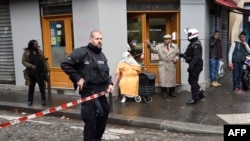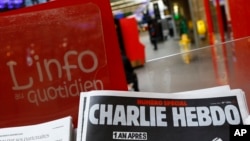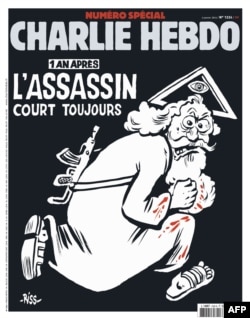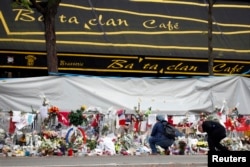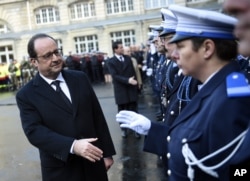French officers on Thursday shot dead an armed man who apparently tried to attack a police station in northern Paris, as France marked the one-year anniversary of the Charlie Hebdo shootings.
The man reportedly wielded a butcher knife and was wearing what was later found to be a fake suicide vest as he tried to enter the building, crying "Allahu Akbar," or "God is great" in Arabic.
The Paris prosecutor said the man, identified as Sallah Ali, was also carrying a mobile phone and sheet of paper bearing the Islamic State flag and claims of responsibility by the militant group written in Arabic.
Some sources said the attacker was a homeless man from Morocco who had been involved in petty crimes.
Coming just minutes after French President Francois Hollande paid tribute to police killed in last year’s attacks, the incident in the tough, immigrant-heavy Goutte d’Or neighborhood offered a grim reminder that the country remains at high risk of more strikes.
Charlie Hebdo commemorations
It also came amid a weeklong deluge of commemorations, debates and documentaries covering three days of mayhem that began January 7, 2015. The anniversary events culminate Sunday with a daylong memorial for the nearly 150 victims of attacks that occurred in January and November last year.
Between the two events were several others, including the decapitation of a French man near Lyon by Islamist Yassin Salhi, and a foiled attack on a Thalys train.
“We need to realize that we’re in a state of total war,” French Interior Minister Bernard Cazeneuve told the Le Parisien newspaper in an interview published before Thursday’s incident, “which implies we need to do everything to dismantle [terrorist] networks, prevent them from striking, find political and diplomatic solutions, support our security and intelligence forces."
“But always,” he added, “with the same compass: a state of law.”
U.S. Secretary of State John Kerry remembered the anniversary of the Charlie Hebdo shootings by praising journalists and saying that an attack intended to create fear instead brought people together.
Earlier in the week, authorities unveiled new plaques honoring the 17 people killed by Islamist brothers Said and Cherif Kouachi, who targeted the Charlie Hebdo magazine, and Amedy Coulibaly, who laid siege to a Jewish grocery store.
Anniversary edition
The irreverent French weekly has since bounced back, publishing 1 million copies of a saucy anniversary edition Wednesday that, in true form, managed to both amuse and outrage. Its cover — portraying God as a gun-wielding terrorist with the headline “The Assassin is still out there” — drew a rebuke from the Vatican.
The Hyper Casher market, where four people were killed on January 9, 2015, is also back in business.
But in ways big and small, France is a very different nation than it was one year ago.
State of emergency remains
A state of emergency, enacted after the November 13 attacks that killed 130 people around the capital, is still in place. Soldiers still patrol sensitive sites, and police continue to carry out dozens of raids, detaining and questioning suspects — but also, critics maintain, unfairly profiling Muslims — under broad new emergency powers.
Anti-Muslim acts have skyrocketed and anti-immigrant sentiment has sharpened. Many Parisians now think twice about taking public transport or going out to dinner, fearful of more violence to come.
On Thursday, Hollande paid his respects to France’s police force, which lost three members in last January’s attacks. They died, the French president said, “so we could live.”
Hollande expressed his gratitude for the security force members who have stood outside schools, airports and other public places to defend against terror attacks.
He also announced that police officers would now be allowed to keep their weapons while off duty, and he pledged to boost armed security forces by 5,000 officers.
Debate is raging over the Socialist government’s proposal to write the current emergency measures into the French constitution. Most controversial is Hollande’s call for stripping convicted terrorists of their French nationality, which has drawn outcries from rights groups and has deeply split the left.
“For us, it’s definitely no!” wrote a group of organizations, including the Paris-based International Federation of Human Rights, which are campaigning against the tougher measures. “No to stripping French nationality, no to democracy under a state of emergency, no to a constitutional reform imposed without debate,” wrote the group.
A recent poll, however, found nearly nine out of 10 French support the plan to revoke citizenship, with most believing it did not contradict leftist values.




